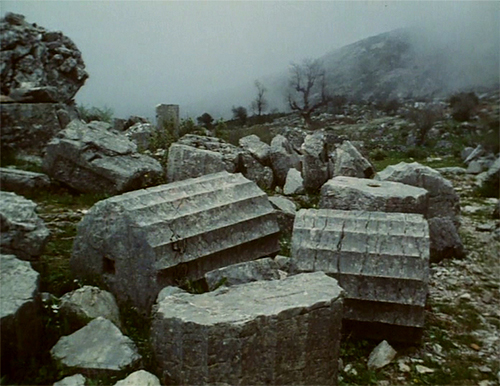
After Méditeranée, Pollet returns to Bassae, a Greek archeological site located in the heart of the Peloponnesian peninsula. Its Doric temple was built by Ictinos and it is the only one located far away from the sea; its orientation is different from the others and it is constructed with local stone.
“These blocks of formless material regain their origins in the mineral kingdom, they had never ceased belonging there... Everything returns to mud, to ashes, nothing can challenge time. How could anything dare to?”
From the off text by Alexandre Astruc
“Ever since I returned from my voyage in the Mediterranean, Bassae is the place that obsessed me most. When I discovered it I told myself: ‘this is where you have to be.’ So we went. There were three of us: I did the photography, there was a Greek stage-hand, and a third carried the material. We wanted to film this object which had lost its significance, but which possessed a fantastic potential for mystery. I asked Sollers to write a comment, but it frightened the producer. So I asked Alexandre Astruc to write another so that the film could be distributed. There are two versions of Bassae, but Sollers’ version has been lost.”
Jean-Daniel Pollet
« Que savons-nous de la Grèce aujourd’hui… Que savons-nous de nous-mêmes, hormis que nous sommes nés là il y a des milliers d’années… Que savons-nous donc de cette minute superbe où quelques hommes se sont sentis solidaires de lui, solidaires de la lumière non pas envoyée par les dieux mais réfléchie par eux, solidaires du soleil, solidaires de la mer… De cet instant à la fois décisif et naturel, le film de Jean-Daniel Pollet nous livre sinon le trousseau complet, du moins les clés les plus importantes… Les plus fragiles aussi… Dans cette banale série d’images en 16 sur lesquelles souffle l’extraordinaire esprit du 70, à nous maintenant de savoir trouver l’espace que seul le cinéma sait transformer en temps perdu… Ou plutôt le contraire… Car voici des plans lisses et ronds abandonnés sur l’écran comme un galet sur le rivage… Puis, comme une vague, chaque collure vient y imprimer et effacer le mot souvenir, le mot bonheur, le mot femme, le mot ciel… La mort aussi puisque Pollet, plus courageux qu’Orphée, s’est retourné plusieurs fois sur cet Angel Face dans l’hôpital de je ne sais quel Damas… »
Jean-Luc Godard1
« Valéry parlait de « méditerranéité poétique». Avec Pollet, on sait qu'il y a une « méditerranéité cinématographique ». Le mythe, l'histoire. Le symbole. Méditerranéité technique, depuis les travaux d'optique aristotéliciens et euclidiens. Repris par les savants arabes: Al-kindi, Al-hazen... Puis la Renaissance. La perspective monoculaire... L'axe, le rail. Et enfin, toujours et encore, le travelling. Ralenti abstractif, sus- pensif, face à l'éc[r]oulement héraclitéen, qui ne laisse derriè- re lui que des ruines. Cinéma du cadre, du fluide, de l'ellipse, de la bonde, de la spirale : accomplissement du mouvement dans l'inerte. Méditerranée poétique. »
Raphaël Millet2
“Why do the ruins of Palmyra, of Balbec, of Egypt attract me so? Why do I get carried away? Why can’t life, everyday life carry me away? What should I answer? There is something unchanging there, whereas life is made of tragedies. There is no tragedy there. There’s just us there. In Bassae, I find “us” again. It’s a bit hard to find what this and a broken jug have in common. There’s no ‘us’ in the jug. The jug is broken. Why do I like it better broken than whole? Let’s just leave this mystery be, because if I knew exactly what to say, I would be a rationalist, I would make rationalistic film, that would speak of such things that would probably not interest anyone anymore...”
Jean-Daniel Pollet3
- 1Jean-Luc Godard, Cahiers du Cinéma, février 1967.
- 2Raphaël Millett, “Cimetères marins : Les Méditerranées de Jean-Daniel Pollet,” dans Jeune, dure et pure, Une histoire du cinema d'avant-garde et experimental en France, Nicole Brenez et Christian Lebrat (eds.) (Paris : Cinémathèque Française, 2001).
- 3Jean-Daniel Pollet, Tours d’horizons (Paris: Editions de l’Œil, 2005).